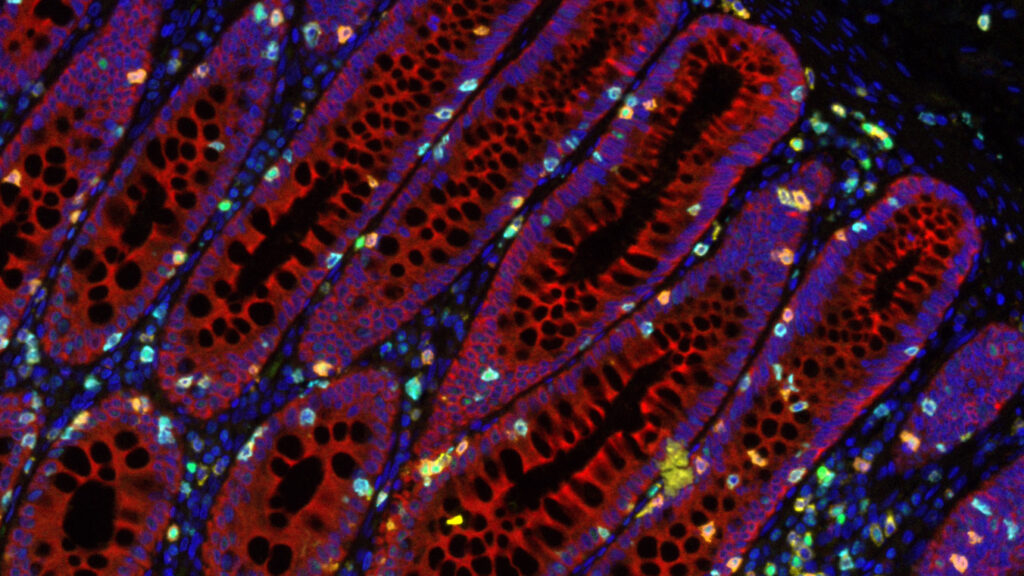Want to stay on top of the science and politics driving biotech today? Sign up to get our biotech newsletter in your inbox.
Buenos dias! Writing from one of the more unique locations in my tenure as a Readout author…. Hola from a mercado in Mexico City. On tap today: Early studies show that checkpoint inhibitors may be more effective if combined with JAK inhibitors. Also, more promising anti-obesity results and perhaps a more potent PrEP for HIV.
advertisement
Sarepta gene therapy approved for most Duchenne patients
The FDA yesterday dramatically expanded its approval for Elevidys, a gene therapy for Duchenne muscular dystrophy, authorizing access for nearly all patients with the fatal muscle-wasting disease.
It’s clear that the treatment, made by Sarepta Therapeutics, won’t be a panacea — “No one pretends this is a cure,” one patient’s mother told STAT’s Jason Mast — but the gene therapy offers at least incremental benefit to patients with Duchenne. It is now approved for all patients over the age 4 who can walk on their own. For patients who rely on wheelchairs, the agency granted accelerated approval, a form of conditional authorization that will have to be confirmed in a larger, ongoing study.
It’s worth noting the approval decision was made almost exclusively by Peter Marks, the FDA’s director of the Center for Biologics Evaluation and Research, who overruled three review teams and two top lieutenants.
advertisement
Can JAK inhibitors bolster checkpoint inhibitors?
Checkpoint inhibitors like Keytruda and Opdivo are fickle: At times they work beautifully in patients, but in others, not so much. But two small clinical trials published in Science found that a JAK inhibitor made by Incyte, when combined with checkpoint inhibitors, led to most patients responding to immunotherapy. In one trial, patients were able to overcome resistance to checkpoint inhibitors, STAT’s Angus Chen writes.
In that study, 10 out of 19 participants with Hodgkin lymphoma whose disease had already progressed or relapsed responded to the drug — and six achieved a complete response. In the other study, researchers combined Keytruda with the JAK inhibitor and saw an improved response.
“It could really change the landscape in terms of treatment for some patients,” an immunologist not involved with the work told STAT. “It opens the door for a whole series of studies for cancers which are treated with immune checkpoint inhibitors which work already, but they’re not perfect and not enough. It may give another arrow in the armamentarium of clinicians.”
Gilead’s experimental PrEP for HIV impresses
Gilead’s new antiviral drug lenacapavir completely protected cisgender women from contracting HIV in a large Phase 3 trial. None of the 2,134 women taking the twice-a-year injection contracted the virus. By comparison, 16 of 1,068 women taking Truvada and 39 of the 2,136 women taking Descovy contracted HIV.
“To have no infections in over 2,0000 women… I mean that’s a remarkable result,” the study’s principal investigator told STAT’s Jason Mast. The trial was conducted in Uganda and South Africa; if a follow-up study in other countries confirms the results, lenacapivir could be approved as a potent pre-exposure prophylaxis, or PrEP, for HIV.
“This offers a really different option, because it is just twice a year, it’s discrete and private, because it’s not in a bottle that you have to carry home, that someone could find,” Gilead’s HIV franchise head told STAT. “For so many people out there in so many different places, this could provide a PrEP option that’s workable for them.”
Zealand Pharma’s anti-obesity drug shows promise
Another investigational anti-obesity drug is showing promise in early stage trials. Petrelintide, made by Zealand Pharma, led to 8.6% weight loss at 16 weeks, compared to the 1.7% weight loss among patients taking placebo in the Phase 1b trial. The injectable drug has a different mechanism than the wildly popular GLP-1 drugs sweeping the market: This drug targets the amylin hormone.
Zealand isn’t the only company with amylin as an anti-obesity target, STAT’s Elaine Chen writes. Novo Nordisk and Eli Lilly are also looking at the hormone, which is produced in pancreatic beta cells and co-secreted with insulin as a response to food intake. Novo has a late-stage candidate in trials called CagriSema that activates amylin, calcitonin, and GLP-1 hormone receptors.
Fauci’s memoir & Alnylam’s tenuous trial
Can Alnylam find success with its latest cardiac treatment after tweaking the trial? And did STAT’s editorial team pull off a covert mission to get an advanced copy of a new book?
We cover all that and more on this week’s episode of “The Readout LOUD.” STAT reporter Jason Mast joins us to discuss Anthony Fauci’s memoir, “On Call,” which was published this week. Hosts Allison DeAngelis and Adam Feuerstein also dissect Alnylam’s forthcoming clinical trial data and take stock of how the biotech markets are succeeding and potentially falling flat midway through the year.
More reads
- Industry groups back drugmakers’ appeal in Zantac cancer lawsuits, Reuters
- J&J’s subcutaneous version of Tremfya excels in Crohn’s disease study, FiercePharma
- Vertex reaches a new deal with NHS England over its pricey cystic fibrosis treatments, STAT

